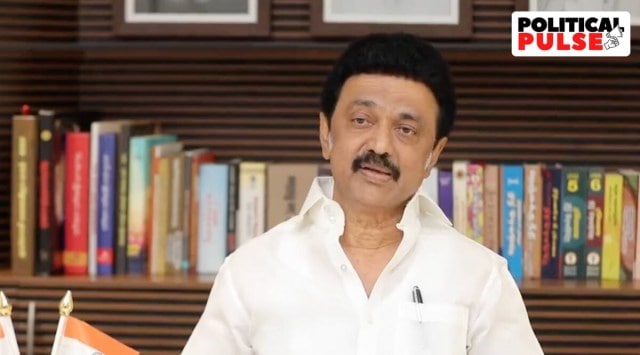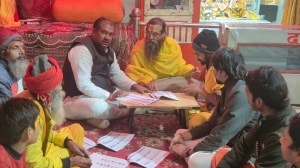AFTER KARNATAKA, it is Tamil Nadu that seems set to emerge as a political theatre for cooperative milk wars. Tamil Nadu Chief Minister M K Stalin has written to Union Home Minister and Minister of Cooperation Amit Shah to “direct” Amul (the Gujarat Cooperative Milk Marketing Federation) to “desist from procuring milk from Aavin’s (Tamil Nadu Cooperative Milk Producers’ Federation) milk shed area” nurtured in true cooperative spirit over decades.
Stating it has been a norm to let cooperatives thrive without infringing on each other’s milk sheds, Stalin said the move by Amul “will create unhealthy competition between cooperatives engaged in procuring and marketing milk and milk products”. Such cross-procurement also goes against the spirit of the ‘Operation Flood’ programme that made India self-sufficient in milk through cooperative sector dairies, he said. Until recently, Amul had only been vending its products via its outlets in the state, he said.

The development in Tamil Nadu comes just over a month after Amul had, on April 5, announced it would start selling milk and curd in Bengaluru. The announcement provided fodder for the opposition, particularly the Congress. Amul’s entry was projected as posing a threat to Nandini, the brand of the local Karnataka Cooperative Milk Producers’ Federation. The BJP suffered losses in the southern districts – including Bengaluru Rural, Kolar, Tumkur, Mandya, Mysore, Hassan and Dakshina Kannada – that form the main milk sheds of Nandini.
Amul, which had only been vending its products via its outlets in the state till recently, has used its multi-state cooperative society licence to install a processing plant and chilling centres in Krishnagiri district of western Tamil Nadu, he said in the letter.
Besides, it is planning to procure milk through self-help groups and farmers’ producer organisations “in and around Krishnagiri, Dharmapuri, Vellore, Ranipet, Tirupathur, Kancheepuram and Thiruvallur districts of our State”.
ExplainedAavin and the Amul challenge
Amul, which had so far only been selling its products in TN, is also procuring milk now. It means more competition for Aavin. Beneath the surface, Stalin’s resentment seems to be taking identity politics to the arena of regional brands.
Industry sources, however, said the Karnataka and Tamil Nadu cases are not comparable. To start with, Aavin is a smaller player, with its average milk procurement at about 35 lakh litres per day (LLPD), as against Nandini’s 80 LLPD. Secondly, Nandini has a 75-80 per cent share in Karnataka’s liquid milk market. Other brands, whether cooperative or private, have a presence largely in northern Karnataka, where Nandini’s procurement operations are also limited.
Tamil Nadu, on the other hand, is a more competitive market. Of the estimated 60 LLPD of milk and curd sales in the state, Aavin’s share is only about 25 LLPD. The remaining 35 LLPD market is with organised private players such as Hatsun Agro Product (‘Aarokya’ brand), Heritage Foods, Dodla Dairy and Creamline Dairy Products (‘Godrej Jersey’).
Story continues below this ad
The industry sources also pointed out Amul hasn’t been very successful in the southern markets where it has been present for the last 8-9 years. In Hyderabad, its sales have fallen from 1.3-1.4 LLPD to about 0.80 LLPD now. In Karnataka, it hardly sells 10,000-15,000 litres per day, mainly in northern markets such as Belgaum and Hubli-Dharwar. “It is much more difficult for an Amul or Mother Dairy to penetrate markets where cooperative or private sector brands are already entrenched. This is unlike in, say, Delhi-NCR,” an industry source said.
Regional cooperatives, the Tamil Nadu CM said, “have been the bedrock of dairy development in the states and they are better placed to engage and nurture producers and to cushion consumers from arbitrary price hikes”.
In Tamil Nadu, a robust three-tier dairy cooperative system, inclusive of Aavin as the apex cooperative marketing federation, has been functioning effectively since 1981, benefiting rural milk producers and consumers alike, he said. Under the Aavin cooperative, a total of 9,673 Milk Producers Co-operative Societies are currently operating in rural areas, securing 35 lakh litres per day (LLPD) of milk from about 4.5 lakh pouring members. Aavin’s critical role extends to providing inputs such as cattle feed, fodder, mineral mixture, and animal health care and breeding services for milk producers.
The letter, following a recent milk crisis in Tamil Nadu, comes in the wake of many turbulences in the dairy sector. The situation was aggravated by delays in milk delivery in numerous locales, including Chennai, in March and April, caused by a supply shortage. The milk shortage had multiple triggers including excessive rainfall in the southern region, escalating fodder costs, and the outbreak of lumpy skin disease in North India, which also had ramifications in South India. And a shift in Amul’s procurement strategies gains significance as the state dairy sector has been also struggling due to the discrepancy between procurement and selling rates of bulk milk by Aavin and private operators.
Story continues below this ad
Private enterprises have created a significant challenge by offering higher remunerations, making Aavin’s operations strenuous. The decision to drop the dairy development minister, S M Nasar, from Stalin’s cabinet, citing poor management of the crisis, also happened two weeks ago.
One of the key factors that played behind the crisis came from DMK’s election promise to increase milk procurement price while lowering the standard milk’s selling price, a promise which was upheld post-elections. Balasubramanian Muthusamy, an expert in the Indian dairy sector with significant associations with Amul and the Institute of Rural Management in Gujarat, said this policy decision was akin to ‘shooting themselves in the foot’. However, he said Amul’s entry into Aavin’s market was detrimental to the cooperative system’s prosperity. “It shouldn’t have happened,” he said.
G Palaniappan, one of the important dairy traders from the state, said Amul shouldn’t have entered into the procurement plans in Tamil Nadu. “It happened in Karnataka and faced protests. If they plan to do it in Tamil Nadu, it may not be good for the cooperative sector,” he said.
Reacting to the letter, K Annamalai, BJP state president, said it was BJP that exposed DMK government’s decision to not procure Aavin milk powder in the nutrition kit tender for lactating mothers despite Aavin coming forward to manufacture it. “Of the total milk produced in Tamil Nadu, Aavin’s dairy milk procurement is 35 LLPD against the total milk production of 244 LLPD in the state. And there are complaints that the average milk procurement has dropped to 32 LLPD after May 2021,” Annamalai said, adding that Stalin chose to divert people’s attention “despite all these shortcomings.”
Story continues below this ad
“Is the Tamil Nadu CM wary of the fact that Aavin’s milk procurement in TN on the overall milk produced in the state is only 14%?” Annamalai asked. He said Stalin needs to consider increasing daily milk procurement and improving the livelihood of the hardworking farmers in the state and focus on making Aavin the number one Milk cooperative society in the country “instead of engaging in his usual theatrics.”

































